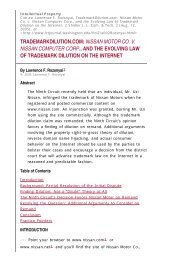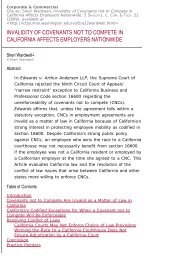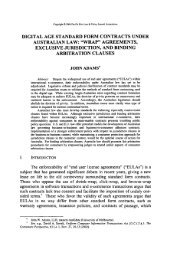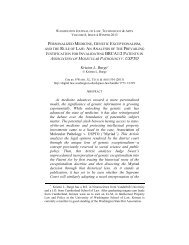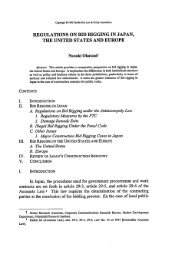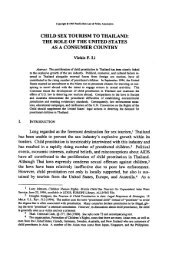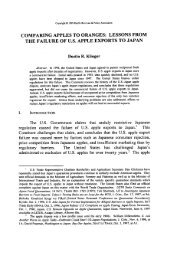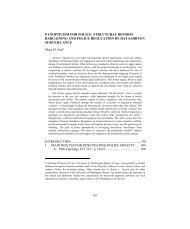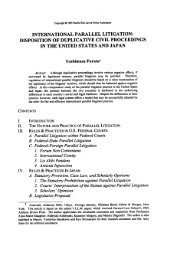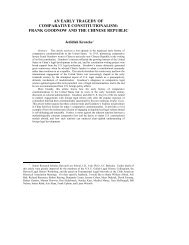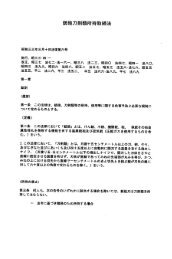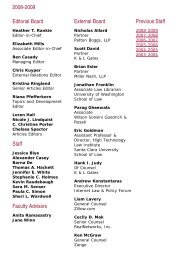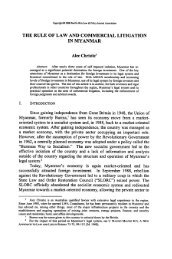the islamic legal system in singapore - University of Washington
the islamic legal system in singapore - University of Washington
the islamic legal system in singapore - University of Washington
Create successful ePaper yourself
Turn your PDF publications into a flip-book with our unique Google optimized e-Paper software.
170 PACIFIC RIM LAW & POLICY JOURNAL VOL. 21 NO. 1<br />
Upon request, <strong>the</strong> Fatwa Committee can issue a fatwa on any po<strong>in</strong>t <strong>of</strong><br />
Muslim law. 56 Any member <strong>of</strong> <strong>the</strong> public can request an op<strong>in</strong>ion from <strong>the</strong><br />
Fatwa Committee, but <strong>the</strong> Committee is not bound to respond to every<br />
request and thus naturally gives priority to questions <strong>of</strong> public <strong>in</strong>terest. 57<br />
Lawyers frequently solicit op<strong>in</strong>ions on behalf <strong>of</strong> <strong>the</strong>ir clients on issues <strong>of</strong><br />
personal status, e.g., <strong>the</strong> validity <strong>of</strong> a marriage conducted outside S<strong>in</strong>gapore,<br />
<strong>in</strong>heritance, legitimacy <strong>of</strong> children, and adoption issues. Any court is<br />
permitted to ask <strong>the</strong> MUIS for an op<strong>in</strong>ion if a case before <strong>the</strong> court raises a<br />
question <strong>of</strong> Muslim law. 58 Upon receipt <strong>of</strong> such a request, <strong>the</strong> MUIS refers<br />
<strong>the</strong> question to <strong>the</strong> Fatwa Committee for an op<strong>in</strong>ion. 59 F<strong>in</strong>ally, <strong>the</strong> Fatwa<br />
Committee may issue a fatwa on its own volition if it identifies an issue that<br />
it feels needs to be addressed. 60<br />
If a judge on <strong>the</strong> Syariah Court asks <strong>the</strong> MUIS for an op<strong>in</strong>ion, one can<br />
reasonably expect <strong>the</strong> judge to follow <strong>the</strong> op<strong>in</strong>ion—if only because, as we<br />
have noted, appeals from decisions <strong>in</strong> <strong>the</strong> Syariah Court go to an Appeals<br />
Board constituted by <strong>the</strong> MUIS president. 61 A more <strong>in</strong>terest<strong>in</strong>g question<br />
<strong>in</strong>volves <strong>the</strong> treatment <strong>of</strong> MUIS fatwas by <strong>the</strong> civil courts. Civil courts,<br />
when faced with a question <strong>of</strong> Muslim law, are not obliged to seek an<br />
op<strong>in</strong>ion from <strong>the</strong> MUIS. 62 They may do so, however, and litigants may also<br />
56<br />
57<br />
AMLA, § 32.<br />
Id. § 32(1).<br />
58<br />
Id. § 32(7).<br />
59<br />
Id.<br />
60<br />
Id. § 32(6).<br />
61<br />
Id. § 55. Fur<strong>the</strong>r, members <strong>of</strong> <strong>the</strong> Appeal Board are nom<strong>in</strong>ated by <strong>the</strong> MUIS, <strong>of</strong> which <strong>the</strong> Mufti<br />
is a member. Any Syariah court decision contrary to a fatwa is likely to be overruled on appeal. In<br />
Za<strong>in</strong>ud<strong>in</strong> B<strong>in</strong> Mohamad v. <strong>the</strong> Registrar <strong>of</strong> Muslim Marriages (Appeal Case No. 19/1997), <strong>the</strong> Appeal<br />
Board stated that s<strong>in</strong>ce even <strong>the</strong> President <strong>of</strong> S<strong>in</strong>gapore is statutorily required to seek <strong>the</strong> advice <strong>of</strong> <strong>the</strong><br />
MUIS <strong>in</strong> respect to <strong>legal</strong> issues under Islamic law, <strong>the</strong> Registrar <strong>of</strong> Muslim Marriages has more reason to<br />
respect and take <strong>in</strong>to consideration <strong>the</strong> fatwas from <strong>the</strong> Islamic po<strong>in</strong>t <strong>of</strong> view.<br />
62<br />
As Muslim law is part <strong>of</strong> <strong>the</strong> law <strong>of</strong> <strong>the</strong> land, civil courts have <strong>the</strong> power to <strong>in</strong>terpret <strong>the</strong> law on<br />
<strong>the</strong>ir own. Alternatively <strong>the</strong>y have, <strong>in</strong> at least one case, allowed parties to agree upon an <strong>in</strong>terpretation <strong>of</strong><br />
Islamic law that would resolve <strong>the</strong>ir dispute. In Shiraz Abidally Husa<strong>in</strong> and Ano<strong>the</strong>r v. Husa<strong>in</strong> Safdar<br />
Abidally, <strong>the</strong> court assured itself that this agreed position represented one <strong>of</strong> <strong>the</strong> legitimate compet<strong>in</strong>g<br />
<strong>in</strong>terpretations <strong>of</strong> Islamic law. It <strong>the</strong>n applied that position, without ask<strong>in</strong>g <strong>the</strong> MUIS for an op<strong>in</strong>ion that<br />
might lead to a contrary op<strong>in</strong>ion. The Court <strong>of</strong> Appeal, <strong>the</strong> highest judicial authority <strong>in</strong> S<strong>in</strong>gapore, was<br />
faced with a case <strong>in</strong>volv<strong>in</strong>g <strong>the</strong> distribution <strong>of</strong> a deceased Muslim’s monies amongst his children. One<br />
party wanted <strong>the</strong> Court to nullify an agreement by all <strong>the</strong> children for <strong>the</strong> monies to be divided equally,<br />
whe<strong>the</strong>r son or daughter. At <strong>the</strong> hear<strong>in</strong>g below, High Court Judge Kan T<strong>in</strong>g Chiu had preceded <strong>the</strong><br />
exam<strong>in</strong>ation <strong>of</strong> <strong>the</strong> facts by <strong>in</strong>vit<strong>in</strong>g <strong>the</strong> parties to commit to an agreed position on <strong>the</strong> various aspects <strong>of</strong><br />
Islamic law <strong>of</strong> <strong>in</strong>heritance. The Court <strong>of</strong> Appeal adopted a similarly cautious position: “we concluded that<br />
<strong>the</strong>re was an agreement among <strong>the</strong> six children on [May 28, 2003] to distribute to <strong>the</strong>mselves equally<br />
regardless <strong>of</strong> <strong>the</strong> quantum <strong>of</strong> moneys rema<strong>in</strong><strong>in</strong>g <strong>in</strong> <strong>the</strong> bank accounts after meet<strong>in</strong>g <strong>the</strong> payments <strong>of</strong> <strong>the</strong><br />
pecuniary legacies under <strong>the</strong> Will. Such an agreement was not <strong>in</strong>consistent with Muslim law and was<br />
b<strong>in</strong>d<strong>in</strong>g on <strong>the</strong>m.” Shiraz Abidally Husa<strong>in</strong> and Ano<strong>the</strong>r v. Husa<strong>in</strong> Safdar Abidally, [2007] SGCA 16.



